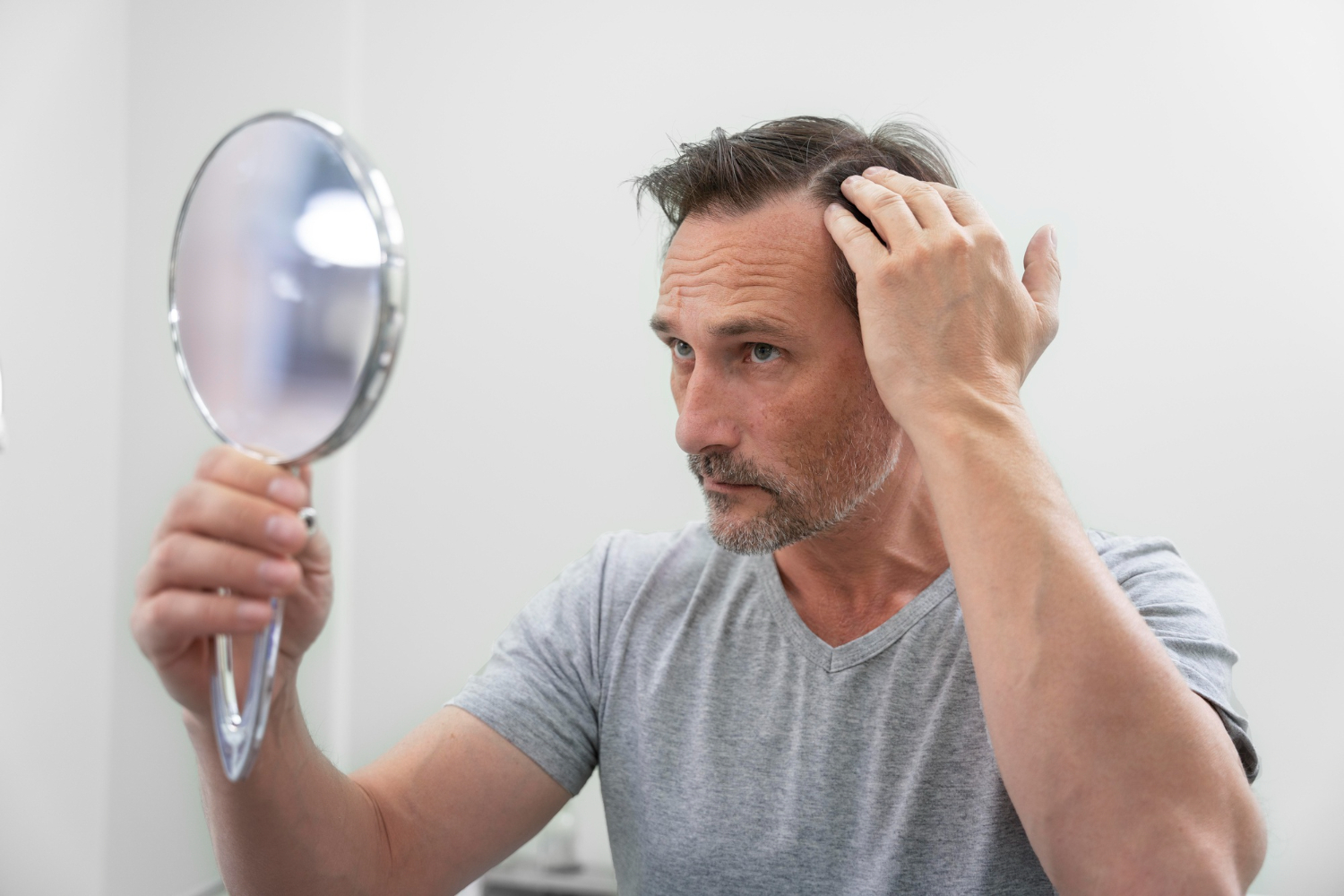
Hair loss can be one of the more frustrating and emotionally challenging experiences for men as they age. Whether it starts as a slow thinning at the crown or a receding hairline in the mirror, the change is often met with confusion and concern.
For many men experiencing hair loss, they often wonder if low testosterone could be to blame. The answer is—it’s complicated. While the connection between testosterone and hair growth is real, it’s often misunderstood and requires more context.
In this article, we’ll break down the science behind testosterone and hair loss, breaking down the correlation while also explaining what other factors may be causing premature hair loss. Additionally, we’ll discuss what you can do if you’re concerned about losing your hair, low T, or both.
How Testosterone Affects Hair Growth
Testosterone plays a vital role in the body’s development and function. It’s responsible for things such as muscle mass, energy levels, mood, and libido. But it also impacts hair growth, just not always in the way you’d expect.
One of testosterone’s byproducts is a more potent hormone called DHT (dihydrotestosterone). When testosterone converts into DHT through the action of an enzyme called 5-alpha reductase, it becomes a critical player in both facial and body hair growth and scalp hair loss.(1)
Here’s how it works:
- DHT attaches to receptors in your hair follicles. On the scalp, particularly at the crown and temples, DHT can shrink hair follicles. Once bound, DHT interferes with the follicle’s ability to function normally, shortening the hair’s growth phase (anagen) and prolonging the resting phase (telogen). (2) Over time, this weakens the follicle and causes it to produce thinner, more brittle hair strands.
- This shrinking process, called miniaturization, makes hair thinner and shorter. Eventually, hair may stop growing altogether, and this sensitivity is genetic. Some men inherit hair follicles that are especially vulnerable to DHT’s effects. Even small amounts of DHT can adversely affect follicular health in genetically predisposed individuals. (3) That’s why two men with the same testosterone level can have very different hairlines.
- The result is male pattern baldness, or androgenetic alopecia. DHT interferes with the follicle’s ability to function normally, shortening the hair’s growth phase (anagen) and prolonging the resting phase (telogen). Over time, this weakens the follicle and causes it to produce thinner, more brittle hair strands.
So while testosterone (via DHT) is involved in hair loss, it’s not necessarily low testosterone that’s causing the issue. In fact, men with normal or even high levels of testosterone may experience significant hair loss due to their body’s sensitivity to DHT.
Is Hair Loss Always Caused by Low Testosterone?
While testosterone can play a role in hair loss, hair loss is not caused directly by low T.
In fact, the vast majority of male hair loss cases—especially in men over 40—are due to genetics. Androgenetic alopecia (hair loss) is inherited and linked more closely to how your hair follicles respond to DHT than to how much testosterone you have circulating in your body. This condition, also known as male pattern baldness (MPB) affects as many as 50 million men in the United States alone. (4)
Testosterone helps support overall hair follicle health, and when levels drop significantly, it can lead to imbalances that affect the hair growth cycle. Men with low testosterone may see reduced body and facial hair, but scalp hair loss is genetically mediated by DHT sensitivity. Hair thinning, when combined with other symptoms of low testosterone, could be a signal that your hormone levels are worth checking, and correcting a hormone imbalance can help restore hair health. (5)
For men experiencing fatigue, low sex drive, and decreased strength, along with sudden or unusual hair changes, it is a sign that hormone treatment may be needed. While hair loss alone is not typically caused by low testosterone, if it occurs with other symptoms, medical assessment is advised from a licensed clinician, such as those at your local Gameday Men’s Health.
Other Common Causes of Hair Loss
Beyond DHT and your overall genetics, there are also several other factors that could be contributing to hair loss. Understanding these causes can help you approach the issue more holistically and avoid unnecessary frustration—or ineffective treatments.
Aging
Hair growth slows naturally as we get older. The hair follicles themselves can shrink and become less active, producing finer and shorter hairs, or cease production entirely.
Age-related hair loss tends to be more diffuse and gradual, and while it affects most men to some degree, the extent and pace can vary based on genetics, hormonal shifts, and overall health.
Nutritional deficiencies
Inadequate intake of key nutrients like protein, iron, zinc, biotin, and vitamin D can all impair hair follicle function. (6) Protein is essential for keratin production (the main component of hair), while minerals like zinc and iron support cellular regeneration and oxygen delivery to follicles. Vitamin D plays a role in follicle cycling and immune function, both of which influence hair growth. Even short-term deficiencies can cause noticeable shedding or slower regrowth.
Stress
High levels of emotional or physical stress can trigger a condition known as telogen effluvium, where a large number of hairs prematurely enter the resting (telogen) phase of the hair cycle. (7) This results in diffuse shedding, often noticeable a few months after the stressful event. Common triggers include major life changes, illness, surgery, or even certain diets.
Medical Conditions and Medications
Several underlying health issues can interfere with hair growth, including lupus, thyroid disorders (hypothyroidism and hyperthyroidism), anemia, or a serious nutritional problem. These conditions can disrupt hormonal balance, nutrient absorption, or immune activity, each of which affects the scalp and hair follicles. (8)
Additionally, certain medications have hair loss as a known side effect. These include, but are not limited to, blood pressure drugs (like beta-blockers), lithium, warfarin, heparin, and amphetamines, and many medications used in cancer chemotherapy.
Symptoms That May Point to Low Testosterone
If your hair loss is happening alongside other changes in your body or mood, low testosterone may be part of the problem.
Particular signs to look out for that may indicate low testosterone include:
- Fatigue and low energy: Constantly tired, even after a good night’s sleep.
- Low sex drive or erectile dysfunction: A sudden drop in libido or performance.
- Loss of muscle mass: Difficulty maintaining strength or muscle tone.
- Mood changes or depression: Feeling irritable, down, or disconnected.
- Hair thinning in combination with other symptoms: Especially if you’re also noticing changes in body and facial hair.
These symptoms together present a stronger case for getting your testosterone levels checked, and potentially starting hormone treatment such as testosterone replacement therapy (TRT).
How Is Low Testosterone Diagnosed?
Diagnosing low testosterone isn’t as simple as pointing to one symptom— it requires a comprehensive evaluation. At Gameday Men’s Health, we take a personalized and medically sound approach to ensure you’re getting accurate, actionable results.
When testing for low T, blood tests are used to measure total and free testosterone. These are essential for determining whether your levels fall below the healthy range, which most doctors agree is around 450 ng/dL. (9) Additionally, your medical history, lifestyle, and symptom patterns can help paint a fuller picture for your clinician. Additional hormone testing can also be performed, such as looking at related hormones like LH, FSH, or estradiol to rule out other causes or imbalances.
Only a qualified provider can determine if your symptoms are truly linked to low testosterone. That’s why working with a team like Gameday Men’s Health is so essential.
Treatment Options for Low Testosterone and Hair Loss
If you’re diagnosed with low testosterone, there are several steps you can take to improve your overall wellness. These changes may also play a role in reducing hair loss, although the exact results will vary from patient to patient.
- Lifestyle changes: Eating a nutrient-dense diet, strength training regularly, and managing stress can naturally support testosterone production without further medication.
- Testosterone Replacement Therapy (TRT): TRT can help restore optimal hormone levels, which may improve symptoms like low energy, reduced libido, and improved muscle strength, enhanced bone density, and maintaining body and facial hair. (10) However, it is unlikely to reduce DHT-mediated scalp hair loss if you are genetically susceptible.
- PRP for Hair Loss: PRP, aka Platelet-Rich Plasma Therapy is a non-invasive solution for men dealing with early to moderate stages of hair loss. PRP isolates healing growth factors from your own blood and reinject them into targeted areas of the scalp to stimulate hair follicles and reactivate growth cycles.
- Medications for hair preservation: Potential medications for hair preservation include finasteride (which reduces DHT production) and minoxidil (which stimulates hair growth). Studies have indicated these medications can be effective for halting hair loss and stimulating regrowth. (11)
Want to learn more about how Gameday can support your hormone health? Visit our Testosterone Health service page or use our Location Finder to schedule a consultation near you.
Why Choose Gameday Men’s Health?
At Gameday Men’s Health, we specialize in helping men take control of their health, energy, and confidence. Whether you’re struggling with fatigue, sexual health, or thinning hair, we’re here to help you get to the root cause of the issue and begin an effective treatment program.
Our experienced team specializes in men’s hormone health, and our licensed medical professionals understand the unique hormonal changes that come with aging.
We pride ourselves on offering private, fast testosterone testing that makes it easy to get accurate results. Furthermore, our customized treatment plans are designed to help you reach your goals. Every solution presented is tailored to your unique health profile.
Hair loss can feel like a mystery, but it doesn’t have to be. Regain control over your health and hair—book your testosterone assessment now at your local Gameday Men’s Health Clinic.
References
- DHT (Dihydrotestosterone)
- Integrative and Mechanistic Approach to the Hair Growth Cycle and Hair Loss
- What Is Hair Miniaturization – How to Tell If It’s Happening to You
- Androgenetic alopecia
- Does Testosterone Cause Hair Loss?
- Diet and hair loss: effects of nutrient deficiency and supplement use
- Telogen Effluvium
- What is hair loss?
- Testosterone Levels by Age
- Testosterone therapy: Potential benefits and risks as you age
- Effectiveness of Combined Oral Minoxidil and Finasteride in Male Androgenetic Alopecia: A Retrospective Service Evaluation






